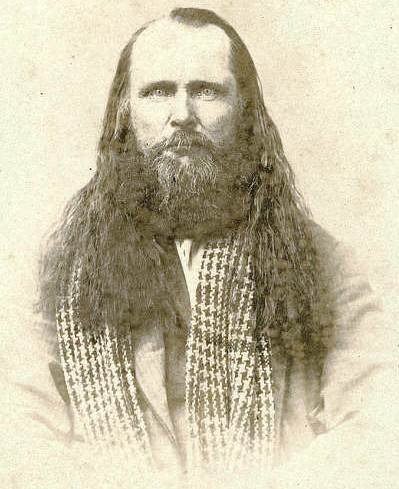
Search
Porter Rockwell

Orrin Porter Rockwell (June 28, 1813 or June 25, 1815 – June 9, 1878) was a figure of the Wild West period of American history. A lawman in the Utah Territory, he was nicknamed Old Port, The Destroying Angel of Mormondom and Modern-day Samson.
Rockwell served as a bodyguard, and was a personal friend, of Latter Day Saint movement founder Joseph Smith. After Smith's death in 1844, Rockwell became a bodyguard of his successor, Brigham Young, and traveled with him and members of the Church of Jesus Christ of Latter-day Saints (LDS Church) to the Salt Lake Valley in the present-day U.S. state of Utah.
Early years
Rockwell was born in Belchertown, Hampshire County, Massachusetts, to Orin and Sarah Rockwell, who were neighbors of the Smith family.
Rockwell was eight years younger than Smith. While Smith was publishing the Book of Mormon, Rockwell picked berries at night and hauled wood into town to help pay for the publishing.
In 1830, at 16-years old, Rockwell was baptized into Smith's Church of Christ in Fayette, New York. Historically, the date of Rockwell's baptism is April 6, the day the church was organized, but original documents suggest a probable date of June 9. Rockwell was the youngest member of the first group to be baptized into the church.
On February 2, 1832, Rockwell married Luana Beebe in Jackson County, Missouri, and was endowed in the Nauvoo Temple on January 5, 1846.
Rockwell killed many men as a gunfighter, a religious enforcer, and Deputy United States Marshal. According to legend, Rockwell told a crowd listening to United States vice president Schuyler Colfax in 1869, "I never killed anyone who didn't need killing", a quote used by actor John Wayne in a movie decades later.
But he [Porter Rockwell] was that most terrible instrument that can be handled by fanaticism; a powerful physical nature welded to a mind of very narrow perceptions, intense convictions, and changeless tenacity. In his build, he was a gladiator; in his humor, a Yankee lumberman; in his memory, a Bourbon; in his vengeance, an Indian. A strange mixture, only to be found on the American Continent.
Boggs attempted assassination accusation
On the evening of May 6, 1842, Lilburn Boggs was shot by an unknown party who fired at him through a window as he read a newspaper in his study. He was badly wounded but survived. Boggs was the governor of Missouri who had signed the Executive Order 44 on October 27, 1838, known as the "Extermination Order" evicting Mormons from Missouri by violent and deadly means.
The Sangamo Journal published a letter by John C. Bennett, a recently excommunicated Mormon who, prior to the assassination, had served as mayor of Nauvoo, Major General of the Nauvoo Legion, and Chancellor of the University of Nauvoo.
Bennett implicated Rockwell in the assassination attempt, writing:
- "In 1841, Joe Smith predicted or prophesied in a public congregation in Nauvoo, that Lilburn W Boggs, ex-Governor of Missouri, should die by violent hands within one year. From one or two months prior to the attempted assassination of Gov. Boggs, Mr. O. P. Rockwell left Nauvoo for parts unknown to the citizens at large. I was then on terms of close intimacy with Joe Smith, and asked him where Rockwell had gone? "Gone," said he, "GONE TO FULFILL PROPHECY!" Rockwell returned to Nauvoo the day before the report of the assassination reached there."
Smith and his supporters vehemently denied Bennett's account.
Rockwell was apprehended in St. Louis on March 6, 1843. In late May, Rockwell briefly escaped from the Independence jail where he was being held.
On September 30, 1843, it was reported:
- "Orin Porter Rockwell, the Mormon confined in our county jail some time since for the attempted assassination of ex-governor Boggs, was indicted by our last grand jury for escaping from the county jail some weeks since, and sent to Clay county for trial. Owing, however, to some informality in the proceedings, he was remanded to this county again for trial. There was not sufficient proof adduced against him to justify an indictment for shooting ex-Governor Boggs; and the grand jury, therefore, did not indict him for that offence."
Though never indicted for the attempted assassination, Rockwell was tried and convicted of jailbreak. Rockwell was released on December 13, 1843—ten months after his arrest.
Nauvoo Years
The morning of September 16th 1845, Lieutenant Frank Worrell of the nearby Carthage militia was shot and killed by Rockwell after refusing an order to stop by non-Mormon Sherriff William Backenstos. Worrell had been the sergeant of the guard at Carthage when the Smiths were assasinated.
Utah years
Following Smith's death, Rockwell followed Brigham Young and the LDS Church to the Salt Lake Valley. In 1849, Rockwell was appointed as deputy marshal of Great Salt Lake City, and remained a peace officer until his death. He was well known for his endurance, loyalty, and relentlessness.
In April 1851, a group of Goshute confiscated some horses that had invaded their territory near Benson Grist Mill. General Daniel H. Wells sent a posse led by Rockwell to pursue the Goshute. They lost the trail of the Goshute that had taken the horses and encountered another group of 20 or 30 people, whom they took prisoner but did not disarm. When some of the captured Goshute tried to escape, one was shot by Custer, a non-Mormon member of the posse. Custer was then shot by one of the Native Americans, who was in turn shot by another posse member. All but four or five prisoners escaped, those that didn't escape were executed by Rockwell.: 11–12
Rockwell operated the Hot Springs Hotel and Brewery at the southern end of the Salt Lake Valley, in an area known as "Point of the Mountain".
Rockwell's fame as a "mountain man" attracted the explorer, Richard Francis Burton. In 1860, on his trip across America to the west coast, Burton stopped to explore the Salt Lake City area. He stayed with Lysander Dayton in a village near the city, and Dayton invited Rockwell to dinner. Rockwell sent for a bottle of Valley Tan Whiskey, and he and Burton drank shot-for-shot into the night, with Rockwell outlining steps Burton should take for safety during his passage to Sacramento. Rockwell advised Burton to carry a loaded double-barreled shotgun, sleep in a "dark camp" (unlit, miles from where supper was cooked), to never trust appearances, and to avoid the main trail, where "White Indians" (so-called because they were white robbers disguised as Indians to avert blame) preyed on travelers.
Death
Rockwell died in Salt Lake City, Utah Territory, of natural causes on June 9, 1878. He was buried in the Salt Lake City Cemetery. At the time of his death, Rockwell had been a baptized Latter-day Saint longer than anyone living. His epitaph reads:
He was brave and loyal to his faith. True to the Prophet Joseph Smith. A promise made him by the prophet. Through obedience, it was fulfilled.
At Rockwell's funeral, apostle Joseph F. Smith, nephew of Joseph Smith and future church president, spoke the following about Rockwell:
They say he was a murderer; if he was, he was the friend of Joseph Smith and Brigham Young, and he was faithful to them, and to his covenants, and he has gone to Heaven and apostates can go to Hell ... Porter Rockwell was yesterday afternoon ushered into Heaven clothed with immortality and eternal life, and crowned with all glory which belongs to a departed saint. He has his little faults, but Porter's life on earth, taken altogether, was one worthy of example, and reflected honor upon the church. Through all his trials, he never once forgot his obligations to his brethren and his God.
However, not all reactions to Rockwell's death were positive. On June 11, 1878, the Salt Lake Tribune stated, "Porter Rockwell is another of the long list of Mormon criminals whose deeds of treachery and blood have reddened the soil of Utah, and who has paid no forfeit to offended law."
Legacy
Rockwell had the distinction of being the subject of a direct prophecy by Smith. After spending eight months in jail on charges of attempting to assassinate Boggs, Rockwell traveled to Nauvoo, appearing unannounced at a Christmas party at Smith's home. After his identity was confirmed, Smith was moved to say:
I prophesy, in the name of the Lord, you—Orrin Porter Rockwell—so long as ye shall remain loyal and true to thy faith, need fear no enemy. Cut not thy hair, and no bullet or blade can harm thee.
The promise echoes one given by an angel to the parents of the biblical Samson.
Rockwell, at one time, cut his hair. After hearing of a balding widow with typhoid fever, he offered his famous long hair to make a wig. The recipient of the hair was Agnes Coolbrith Smith Pickett, widow of Smith's brother, Don Carlos.
The Porter Rockwell Trail is a walking trail that spans Lehi, Draper, White City, and Sandy.
Cultural influence
Two statues of Rockwell exist: one near the old site of his Hot Springs Hotel and Brewery near the Utah State Penitentiary, the other in Lehi, Utah, off of Main Street behind the "Porter's Place" The restaurant has since moved to Eureka, Utah.
Rockwell's life was examined on The Dollop, a comedic podcast that examines American history, in episode #74.
Rockwell's life was examined again on Let Them Fight: A Comedy History Podcast, a comedic historical podcast that examines violent people throughout all history, in episode #120.
See also
Notes
References
External links
- Media related to Porter Rockwell at Wikimedia Commons
- "Did Orrin Porter Rockwell Shoot Lilburn Boggs, Governor of Missouri?", Mormonism Researched by Kerry A. Shirts
Text submitted to CC-BY-SA license. Source: Porter Rockwell by Wikipedia (Historical)
Articles connexes
- Attempted assassination of Lilburn Boggs
- Rockwell
- Rockwell (surname)
- Lilburn Boggs
- Aiken massacre (Utah)
- County Line: No Fear
- Mountain View Corridor
- Lauritz Smith
- Ironport (drink)
- Joseph Smith and the criminal justice system
- Hot Springs Hotel and Brewery
- Utah War
- 1838 Mormon War
- Utah State Route 131
- James Coburn
- Out of Liberty
- Early participants in the Latter Day Saint movement
- Lehi, Utah
- United States Marshals Service
- Bluffdale, Utah
Owlapps.net - since 2012 - Les chouettes applications du hibou



